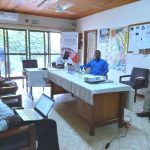Despite efforts by the World Health Organization (WHO) to implement innovative and advanced strategies to combat malaria, the World Malaria Report 2022 indicates that more than 600,000 people die of malaria yearly. Most of these deaths still occur among children under five, who are the most vulnerable.
Suboptimal quality of health care and access to care are responsible for most deaths. As such, more actions are needed to ensure the quality of care for children receiving malaria diagnosis and treatment. Robust health systems are the foundation for successful responses to health interventions, including malaria. Health systems must be radically reoriented towards Primary Health Care (PHC) because about 90% of essential health services can be delivered through PHC. A PHC approach to malaria management will enhance health interventions at the community level and extend the reach of health services.
Interview with the Deputy Programme Manager, National Malaria Elimination Programme
As part of activities to commemorate World Malaria Day 2023, ARHR sought the perspective of the Deputy Programme Manager of Ghana’s National Malaria Elimination Programme (NMEP) (formerly National Malaria Control Programme), Dr. Nana Yaw Peprah, to know Ghana’s journey so far in the fight against malaria and the essence of the commemoration.
Relevance of the Commemorations
Dr. Peprah indicated that World Malaria Day is commemorated annually to take stock of the fight against malaria since its inception by documenting progress made, identifying challenges being faced and then developing innovative solutions to improve the management of malaria.
‘World Malaria Day is commemorated annually to highlight progress being made to end malaria since its inception in 2008. It is an opportunity to seek continued investment, sustained collaboration and commitment as well as increase awareness and ownership of malaria interventions at the community level’, he said.
Dr. Peprah believes the commemoration allows organizations and individuals to know the various malaria elimination interventions Ghana’s NMEP is implementing to reduce the malaria burden and how these organizations and individuals can support the malaria fight agenda.
‘We also use the day to discuss the varied interventions available to protect the vulnerable, i.e., children under five years and pregnant women’, he emphasized.
Ghana’s Journey in the Fight against Malaria
Dr. Peprah revealed that malaria control in Ghana had choked remarkable successes over the past years mainly due to implementing strategic, cost-effective interventions. This assertion is confirmed as the World Malaria Report 2022 reveals that Ghana is among eight countries in the WHO African Region that has met the target of a reduction in malaria case incidence of 40% or more between 2015 and 2021.
Despite malaria being endemic and perennial in Ghana, with children under five having the greater brunt, much has been done to eliminate the disease burden. Dr. Peprah mentioned that there had been a paradigm and strategic shift from controlling malaria to eliminating the disease.
‘This year’s commemoration under the theme “Time to Deliver Zero Malaria: Invest, Innovate, Implement” comes at a critical time when the country has changed the paradigm from Malaria Control to Elimination, he said.
Dr. Peprah indicated that the name change was motivated by the country’s success in reducing malaria morbidity and mortality and was confident that malaria could be eliminated due to the availability of tools.
Elimination of Malaria in Ghana
Dr. Peprah maintained that zero malaria in Ghana was attainable because the power lay in our collective and individual actions. Speaking on actions needed to attain zero malaria in Ghana, he advocated for increased political will; multi-sectoral collaboration; domestic and international resource mobilization; and community involvement and ownership.
He called on the government and policymakers to keep malaria financing high on the political agenda. Also, the multi-sectoral collaboration required other ministries and agencies to be part of the fight. Community leaders will also have to lead and mobilize all community members to be on board to eliminate malaria in Ghana.
About Dr. Nana Yaw Peprah
Dr. Nana Yaw Peprah is a member of the Ghana College of Physicians and Surgeons, American Society of Tropical Medicine and Hygiene, and a Deputy Programme Manager at the National Malaria Elimination Program (NMEP) of the Ghana Health Service.
He is an Epidemiologist and a facilitator for the Malaria Monitoring and Evaluation Module for the Master of Public Health students at the University of Ghana, Legon. He is an expert in research, surveillance, monitoring, and evaluation.



